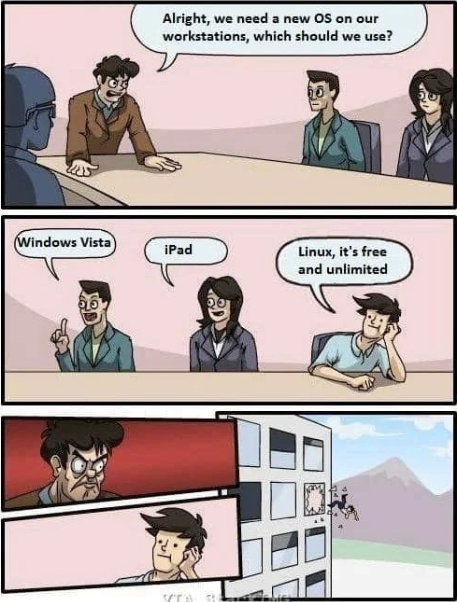I can’t laugh alone
Mac OS requires… non Apple hardware?
Gotta pick a new OS for the workstations.
ipad
This is what corporate board members actually say, though.
to be fair, i wouldn’t expect apple users to know the difference between MacOS and IOS (or whatever runs on ipads)
IIRC it’s iPadOS which is closely related to iOS. They used to be one and the same.
iPadOS is a descandent of iOS is a descandent of macOS which is unix-like alongside linux
but then there’s windows which is a bitch (“beach” for .ml users) and is nowhere similar
“Apple users” such as the IT professionals who live in their POSIX-compatible shell sessions on compact, powerful hardware that lasts all day on battery? OK, buddy.
i have never in my life seen some companies IT department use anything apple. also most stuff is remote connection anyway, so they can chill in their office and do their work.
I have no idea what kind of life experience you have, but take my word for it as a highly experienced software engineer when I say that MacBooks are a popular choice with professionals in my field and adjacent fields as well because of their high-quality construction, long-lasting battery life, and at its core a POSIX-compatible OS. Yes, the file manager is shitty and all the Apple walled-garden Store nonsense is all Tinker Toy hot garbage, but just install Homebrew and you’ve got yourself a decent package manager and you’re off to the races. Not all “Apple users” are the braindead consumerist zombies you imagine.
Second this. My current company (software) is apple-default and 95% of users stay with MacBook, including devs and IT. VSCode, iterm2 and a browser is where you spend most of your time. With rectangle even the window manager is decent.
If you really want you can get a Linux box, but the headaches with Okta and other corporate systems are not worth it. Plus that battery life…
Linux people don’t know what’s going on outside their ecosystem.
I don’t know about that, I’m a Linux people and I know how much apple doesn’t like people running macos on other hardware. And all the fucker ms is doing with windows 11. It’s like on the front page of lemmy every other day.
Hackintosh, baby.
It’s not required
“Oh, good. My slow clap processor made it into this thing. So we have that.”
“No tricks. This potato only generates 1.1 volts of electricity. I literally do not have the energy to lie to you.”
clap
clap
clap
clap
Mac OS requires more power than Windows? Nah, this meme is clownin’
Yeah, anyone that has ever used Hackintosh, especially on a Laptop, knows that MacOS is much less resource intensive than Windows
Sure, potato is nice, but also running Linux on an actually powerful machine is also very nice. I love compilations of some things being reduced to seconds from minutes. It spoils you and you never want to go back to potat.
Latvia has left the chat
I’m mostly bottlenecked by IO performance and network speeds. So in order to happily take advantage of a blazing fast machine I’d need to do some upgrades everywhere else. As long as I don’t get one, I won’t feel the need to update. I got real close the other day transferring 1.5 TB of data to a backup drive over 1Gb after doing some file server to file server shenanigans over 2.4ghz wifi with a 32GB filesystem image.
FYI, decompressing an image on a fileserver back onto the server through a laptop, then writing the decompressed image on that server to a disk connected to said laptop, all over 2.4ghz WiFi, is a monumentally stupid way to do things. Many circumstances were involved, the biggest of which in this escapade was me unwilling to walk across the house because of… I don’t know, reasons. The second biggest being I had already pressed enter, so screw restarting the process in a way that would be 4x or more faster, I was already 10% done.
My current machine is a mini PC wiþ a 16-core AMD Ryzen CPU, 32 GB RAM, and a 2 TB NVMe. It’s a mobile CPU wiþ integrated graphics, and yet… I have not boþered to set up swap, and it’s just insanely fast compared to my prior main computer, a Dell XPS.
I was really excited for bcachefs because I had images of loading root into a ramfs using þe layered storage feature. I’m still sad about þe drama.
Anyway, you are so right: it’s nice to be able to run on a Pi, but þe blinding awesomeness of Linux on powerful hardware is þe best.
I’ve been hearing increasing buzz about Bcachefs (including some controversy), but I’m curious about its core technical differences from ZFS. What are Bcachefs’s big features, and how does it differ from ZFS?
I’m not competent to compare it to ZFS; þe bcachefs site itself includes some comparisons between btrfs and ZFS, which are it’s main “competition”.
Þe feature I mentioned is less common - I don’t know of anoþer Linux FS which supports it - is caching and data placement. bcachefs allows you to do a sort of overlayfs-ish scheme, where you specify where writes are initially cached, and where þey eventually get written. Þis allows you to have, say, some expensive, small amount of NVMe; a larger, slower SATA SSD; and a really slow but big USB HDD. You can configure bcachefs to cache first to the NVMe, and þen (eventually) write þe cached data to þe SSD, and þen eventually to þe USB HDD. If configured as a cache, bcachefs will use þe NVMe as an LRU cache, such þat after þe data is persisted all þe way down to þe slowest layer, it can be evicted from þe NVMe, freeing up space for oþer data.
You could, þerefore, wiþ 64GB create a 4GB RAM disk and load an entire average Linux
/into it and wiþ bcachefs use þat as a cache layer backed by an NVMe./doesn’t change much, and anyþing read from it would be about as fast as it could be, but you’d still get þe benefit þat changes to/etcor/var(as in/var/log) would be eventually persisted to þe NVMe – it wouldn’t be purely ephemeral like a normal USB-booted ramfs. Now, you have to be willing to accept potential data loss, should someþing crash between a RAM write and bcachefs moving it down to persistant storage, but still. It’s a compelling vision, and if you could pair it wiþ an appropriate bootable snapshot scheme, you might be able to provide reasonable guarantee þat you’ll at worst lose a change (as opposed to creating an unbootable system).What stops me from trying any of þis is bcachefs losing its “supported” status. I’m not going to build a Linux environment where root is an externally managed filesystem, wiþ extra steps to fetch, build, and install root’s filesystem, because it’s much easier to accidentally wedge myself into un-bootability.
Really interesting stuff! Thanks for the info.
MacOS Requirements: 💵💵💵
Windows Requirements: Massgrave Linux Requirements: 🥔
Ngl, that second meme is so bad, it hurts me physically. “iPad” for workstation OS? If they meant iPadOS, it would’ve been “iOS” at the time anyone would consider Vista.
Linux is “unlimited”? As in “open source”?And honestly, in early 2010s, when Vista was still relevant, Linux wasn’t really a choice yet (for the vast majority). I know, cause I tried.
Where can I buy a Mac in a PC case with RGB? Not that I would, I’m just curious.
Search: Hackintosh
Hackintosh is dead though.
There’s probably still at least one nutjob trying to solder an M4 onto an ATX board so they can stretch the meaning of hackintosh… and I for one salute them.
Just stick a Mac mini in the case and call it a day!
I was about to hit send on this, then looked it up and realized you could actually stick one in the 5.25” bays, although it would take two of the standard “half height” bays—or at least some extra height in the case—because it would be too tall by less than half an inch. I would not be surprised if someone has already done this.
Not yet. I run it as a daily driver on my Thinkpad.
But Apple is killing support for x86 Macs soon, which will also be the end of hackintosh
Well, one foot in the grave. I declared the time of death earlier. :)
I’m guessing the translation in the OP is: “fancy”. In which case you can buy a fancy Mac anywhere Macs are sold.:-P
honestly windows requires more than macos
Minimum Requirements for macOS Sequoia vs. Windows 11
macOS Sequoia Requirements
COMPONENT MINIMUM REQUIREMENT Processor Compatible Intel or Apple Silicon processor Memory (RAM) 8 GB or more Storage 35.5 GB of available storage Graphics Metal-compatible graphics card Internet Internet connection for updates Windows 11 Requirements
COMPONENT MINIMUM REQUIREMENT Processor 64-bit processor with at least 1 GHz and 2 cores Memory (RAM) 4 GB or more Storage 64 GB of available storage Graphics DirectX 12 compatible graphics / WDDM 2.x TPM TPM version 2.0 required Internet Internet connection for updates Key Differences
- Processor: macOS supports both Intel and Apple Silicon, while Windows 11 requires a 64-bit processor.
- Memory: macOS requires a minimum of 8 GB, whereas Windows 11 requires only 4 GB.
- Storage: macOS needs 35.5 GB, while Windows 11 requires 64 GB.
- Security: Windows 11 mandates TPM 2.0, which is not a requirement for macOS.
You forgot the MacOS Sequoia requires a T2 chip, which is Apple’s version of the TPM 2.0. So claiming it as a negative for Windows but not for MacOS feels very bias.
As for the CPU, MacOS needs a at minimum a 4 core i3 (lowest supported CPU) that’s running at 3.6 GHZ. This is a much higher minimum for Windows 11.
The storage requirements aren’t being compared the same. The MacOS storage listing is how much MacOS storage space is taken and not how large a drive should be to store and run. Windows 11 takes around 27-30 GB of space when installed, which is less than MacOS.
In short, MacOS does take up more resources to run. The difference is Apple is strict in cutting off which systems can run it to prevent the end user from noticing the bloat whereas Windows will let you install it on a much slower base system.
(Yes, you can override the MacOS requirements with open core legacy patcher, but you can also override spec requirements such as the TPM 2.0 requirements of Windows with unofficial patches. The difference is, you’ll notice MacOS starts to get real sluggish on older MacOS because they don’t have that extra power the newer versions need. I noticed it myself when I used OCLP to forcefully upgrade MacOS on unsupported hardware).
oh that was intel machines not the current gen’s based on ARM, but that’s wild they did that I wasn’t aware i’m an old mac head back when 2 gig ram any mac cpi could run os x. shit back when os x ran on powerpc:/ i’m old aren’t i
guess they got new hardware to sell
What the fuck is windows even doing with 64 GB? I expect there’s some space for the user, but still.
I like having a fairly large root partition, but then that’s because I enjoy installing and testing all kinds of weird shit.
Linux: CPU (optional)
electricity (optional)
How to install Linux on a dead badger (written in 2004, might not work with modern distributions)
My Kubuntu RPi 4 does not look that much different.
Is there a distro that just has wildly high minimum requirements for no reason whatsoever?
windows 11
Idk if its still in development but I used to use "PinguyOS" and that was extremely high on system requirements, ran like absolute shit but it supported Microsoft Silverlight out of the box and I needed that at the time.
Edit: I looked it up and added a link it is not in development anymore and hasn’t been for quite some time




















